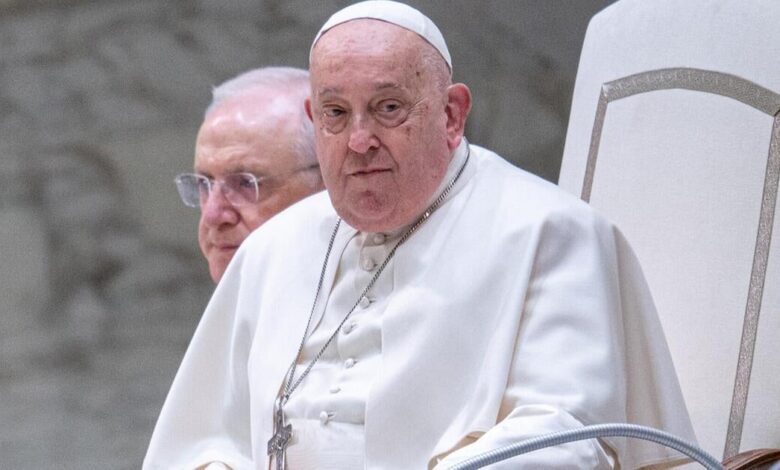Pope Francis has bilateral pneumonia and a “polymicrobial respiratory tract infection.” Here’s what that means.

Pope Francis has a complex infection in his respiratory system and will require more targeted drug treatment, according to Vatican authorities Monday. On Tuesday, he underwent a chest CT scan, which showed the onset of bilateral pneumonia, requiring further drug therapy, the Vatican press office said.
The 88-year-old pope has been hospitalized since Friday at Rome’s Gemelli hospital after coming down with bronchitis the week before, and officials said he is suffering from a “polymicrobial respiratory tract infection.”
Here’s a look at the Pope’s diagnosis and what his treatment could involve.
What is bilateral pneumonia?
Bilateral or double pneumonia is when you have pneumonia in both lungs. Pneumonia is an infection that inflames the air sacs of the lungs, which can lead to them filling with liquid. Symptoms include cough, fever, chills and trouble breathing.
Pneumonia can range from mild to life-threatening. It’s most serious for infants and people older than 65 as well as people with heart problems or weakened immune systems.
This development was a likely worry given the pope’s medical condition.
“Even though we can treat pneumonias with antibiotics, pneumonias are also one of the leading causes of death,” said Sauler of Yale University. He said antibiotics don’t work in isolation and that a person’s immune system is also critical to fighting off pneumonia, pointing out that the immune systems in older people aren’t usually as resilient.
“When you’re 88 years old, the age of the pope, then all of a sudden you have risk factors that make the situation tougher than just a routine pneumonia.”
What is a polymicrobial respiratory tract infection?
Essentially, it means there’s a mix of bacteria, viruses, fungi or parasites growing in someone’s lungs.
“Often times, people will get a bronchitis or an airway infection and that can often start a cascade of multiple problems, including infections in the lungs,” said Dr. Maor Sauler, who specializes in adult pulmonary and critical care medicine at Yale University’s School of Medicine. He said such issues were common in older people whose immune systems might be weaker or had complex health issues.
“It likely means he has more than one organism in his lungs,” Sauler said, explaining that the pope’s doctors might have to adjust his treatment to make sure the antibiotics attack all the various organisms.
Pneumonia is a diagnosis of inflammation or fluid in the lungs, which can caused by a viral, bacterial or fungal infection. “Bilateral” pneumonia means the infection has developed in both lungs.
How serious is polymicrobial respiratory tract infection?
For someone with the pope’s medical history — he lost part of his right lung decades ago and has previously had pneumonia — it’s worrying that he’s been hospitalized.
Dr. Nick Hopkinson, medical director of Asthma + Lung UK, said most healthy people would likely recover quickly from bronchitis.
But in people whose lungs are already damaged, “bacteria can come and colonize the airways … and you start to see infections which makes it more difficult to treat.” In people with lungs that have been previously compromised, they might need help breathing, including oxygen support or chest physiotherapy to help them clear fluids building up in their lungs.
Still, Hopkinson said that getting the pope on the right medications should help.
“If they’ve identified particular things to treat, they can treat those and he’ll start to recover.”
How long might this take?
That depends. Antibiotic treatments typically take from a few days up to about two weeks. Hopkinson said the pope might be given various medicines, including ones that people typically take for asthma or conditions like chronic obstructive pulmonary disease, in addition to getting physiotherapy to help keep his chest as clear as possible.
“Some infections require prolonged treatment because they’re just harder to clear from the system,” Hopkinson said. “It sounds like they’ve identified the bugs that are responsible and they’ll be able to treat those…but we’ll just have to wait and see.”
Dr. Peter Openshaw, a lung expert at Imperial College London, said the presence of multiple organisms wasn’t unusual in people with complex medical histories but could be hard to manage.
What will doctors be monitoring next?
Sauler said the biggest thing to watch out for in the coming days is any sign that the pope is getting worse.
“I’d be most interested in making sure he’s not worsening despite the best efforts (of his doctors). That’s usually a bad prognostic sign,” he said, adding that they would likely review his condition in a few days to see whether or not the prescribed drugs are working.
“I have optimism and hope that he can pull through with the right antibiotic.”
What are the pope’s other health issues?
Pope Francis has been treated for a number of health issues in recent years, including two abdominal surgeries and several previous respiratory infections, including one that hospitalized him days before Holy Week in 2023. Knee trouble led him to cut back on travel, and he often uses a wheelchair.
He said in 2022, “I think at my age and with these limitations, I have to save (my energy) to be able to serve the church, or on the contrary, think about the possibility of stepping aside.”
But in a rare interview with CBS News’ Norah O’Donnell in 2024, the pope described his health as “fine” and said he had no plans to leave the papacy.
“Maybe if the day comes when my health can go no further,” Francis said. “Perhaps because the only infirmity I have is in my knee, and that is getting much better. But it never occurred to me.”
https://assets1.cbsnewsstatic.com/hub/i/r/2025/02/17/e99ea473-045e-4c58-b78e-6680f1bc9173/thumbnail/1200×630/8f7c3b2ac51d539b33e82c6e923936e0/cbsn-fusion-popes-hospital-stay-extended-vatican-says-thumbnail.jpg?v=db3d87ba7bf4d4ff13b65eabcf0d9bea
2025-02-18 14:29:58




